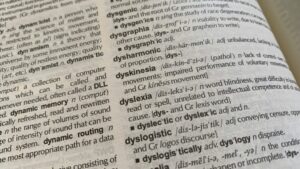 In this video, I speak about the loneliness that many people with dyslexia can feel, especially if their reading difficulty hasn’t been identified and they’re not receiving any help or support for it. I discuss the ”masking” that can occur as a result, as a way to hide one’s dyslexia. At such times, it’s important to find support that offers a more positive view of one’s reading difficulties and gives clear steps to overcome them. The video provides information about many organizations or groups that advocate for dyslexic individuals, including national associations, online social networks, divisions of colleges and universities focused on neurodiversity, library adult reading classes, and more.
In this video, I speak about the loneliness that many people with dyslexia can feel, especially if their reading difficulty hasn’t been identified and they’re not receiving any help or support for it. I discuss the ”masking” that can occur as a result, as a way to hide one’s dyslexia. At such times, it’s important to find support that offers a more positive view of one’s reading difficulties and gives clear steps to overcome them. The video provides information about many organizations or groups that advocate for dyslexic individuals, including national associations, online social networks, divisions of colleges and universities focused on neurodiversity, library adult reading classes, and more.
_______________________________________
Subscribe to my blog feed and receive a 200-item Neurodiversity Strengths Checklist
For more information about neurodiversity, see my books:
- The Power of Neurodiversity: Unleashing the Advantages of Your Neurodivergent Brain (Completely Revised and Updated Second Edition), and
- Neurodiversity in the Classroom: Strength-Based Strategies to Help Students with Special Needs Succeed in School and Life.
This page was brought to you by Thomas Armstrong, Ph.D. and www.institute4learning.com.
Follow me on X: @Dr_Armstrong




















